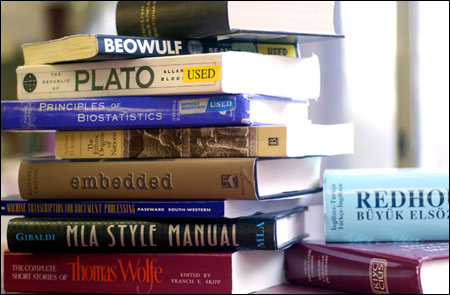Undergrad education review released
Proposes significant changes in structure and content

Marking the end of the first phase of Harvard College’s comprehensive review of undergraduate education, William C. Kirby, dean of the Faculty of Arts and Sciences and Edith and Benjamin Geisinger Professor of History, announced the release of “A Report on the Harvard College Curricular Review.” The report affirms Harvard’s commitment to a liberal education in the arts and sciences and proposes significant changes in the structure and content of the undergraduate experience.
In a reaffirmation that a liberal education in the arts and sciences is central
To read a Summary of Principal Recommendations, and the full report, and for more information about the curricular review, please see: http://www.fas.harvard.edu/curriculum-review/.
to the development of students who are disciplined and independent thinkers, the report seeks to broaden the scope of a liberal education for the early 21st century. It proposes new emphases on international studies and on the sciences. It sets out a new framework for general education that expands student choice while providing for a series of foundational Harvard College Courses that integrate broad areas of knowledge across the academic disciplines. It recommends more intense student-faculty contact in smaller courses across the curriculum. It also recommends enhanced educational opportunities with the other Schools at Harvard, to make the most of the College’s position in a great research university.
“In an age of ever-greater specialization, professionalization, and fragmentation, this report commits the faculty to educating broadly knowledgeable individuals who are curious, reflective, and independent citizens of a global society,” said Kirby.
“Our students have asked both for more flexibility in choosing their courses and for more guidance about what the faculty consider most important and worthwhile to learn,” said Benedict H. Gross, dean of Harvard College and George Vasmer Leverett Professor of Mathematics. “Those are both worthy goals, and this report aims to advance our progress toward meeting them.”
Kirby said that with America’s inescapable influence around the world, Harvard, as a leading American university, has a particular responsibility to educate its students to be global citizens. “We have a responsibility to educate our students as citizens not only of the United States, but also of the world, with the capacity not only to understand others, but also to see themselves, and this country, as others see them,” he said.
Because science and technology are transforming our world at the practical and most philosophical levels, the report proposes that all Harvard College students receive an education in the physical, applied, and life sciences that is as broadly shared as the humanities and social sciences components of a liberal education. “We need to assure all of our students of an education in – not just an introduction to – the physical, applied, and life sciences,” Kirby said.
In a letter to the faculty that accompanied the report, Kirby also addresses the Core Program and its proposed replacement. Harvard College Courses would go “beyond the disciplinary perspectives that define our current Core Program,” he said. “Such courses would be aimed to expand the horizons of both faculty and students; develop and reinforce critical skills in reasoning and expression; and prepare distinctive course material for use in, and possibly beyond, Harvard College,” he said.
The review, launched in October 2002, now enters a phase of faculty and student discussion and deliberation. The FAS aims to translate the review’s broad principles into concrete legislation by the end of the next academic year. A central task of this new phase will be to develop further the general education framework laid out in the report. This will entail the development of creative new approaches to providing foundational instruction in major fields of knowledge, to fostering interdisciplinary study, to involving Harvard undergraduates with faculty from across the University, and to enhancing student learning through group work and a more imaginative use of technology.
“The hard work and commitment of Deans Kirby and Gross and that of all of the faculty, students, and staff has brought us to this important point,” said University President Lawrence H. Summers. “I commend in particular the emphasis on empowering students through greater flexibility to partake much more broadly and deeply of Harvard’s considerable intellectual resources.”
To date, faculty, students, staff, and alumni have participated on committees, in communitywide forums, residence-based discussions, and via a specially created e-mail address. At the heart of the effort, 50 faculty, students, and staff comprising a steering committee and four working groups have met regularly this year; these groups examined pedagogy, general education, concentrations, and students’ overall academic experience.
“I am deeply grateful to the steering committee and the working groups, who have worked so intensely to understand the past, assess the present, and provide us with a framework that will lead to a creative, meaningful vision for our future,” said Kirby. “I thank all involved for their dedication to this process; the continued engagement of the FAS community will be invaluable.”




